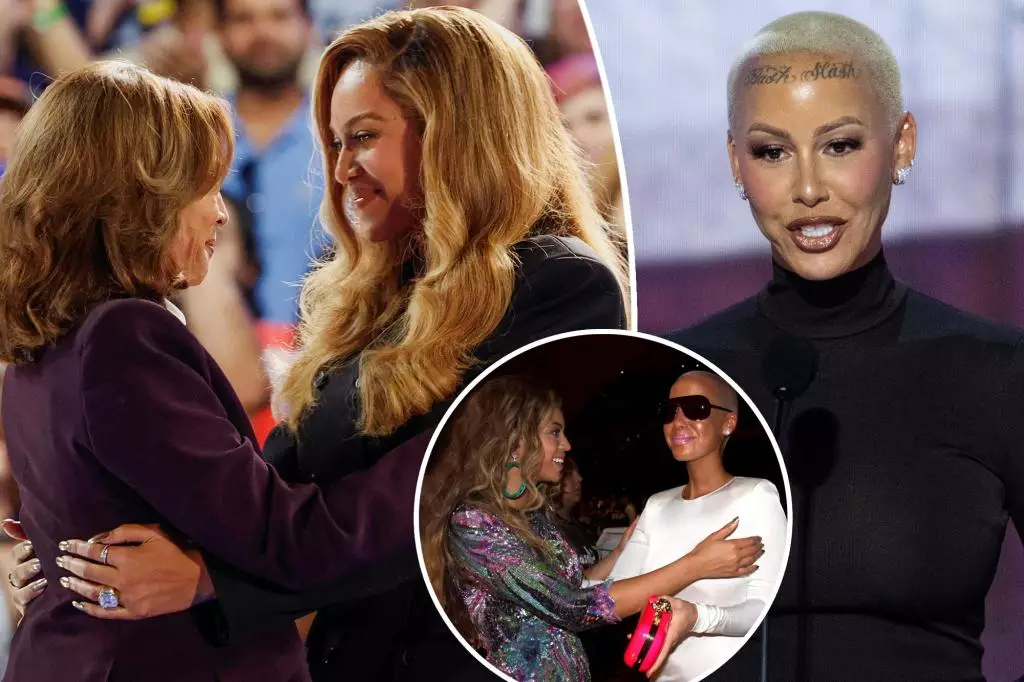In the realm of celebrity interactions, few incidents can spark more intense debate than a public comment about another star, particularly when it involves someone as beloved as Beyoncé. Amber Rose, a prominent figure in popular culture, recently found herself facing significant backlash after she accused Beyoncé of “stealing” her speech during an event for Kamala Harris. This statement quickly escalated into a viral conversation, leaving many to question the implications of such remarks and the motives behind them.
Rose’s insistence that her commentary was made in jest raises intriguing questions about the nature of social media and public perception. During a candid conversation with TMZ on her way to a Halloween party, she asserted, “I was literally trolling… I did not think that was going to be international news.” This statement reflects the unpredictable nature of the internet, where a casual comment can morph into a global topic of discussion within minutes.
The primary issue arising from Rose’s comments is the perception of authenticity and the blurred lines between trolling and genuine critique. Rose’s assertion that she was simply joking does not mitigate the damage caused to her reputation in the eyes of many. This example underscores how, in the age of social media, the act of trolling can veer dangerously close to damaging personal relationships and public personas.
Beyoncé’s impactful speech at Kamala Harris’s rally is not to be overshadowed. The singer’s heartfelt endorsement of the vice president and her emphasis on the importance of voting captured the attention of over 20,000 attendees, as well as countless viewers online. She articulated her role as a mother who wishes for a better future, a compelling narrative that resonated deeply with her audience. Her call to action—imploring citizens to engage in the electoral process—reflects her commitment to social issues, a facet that has long defined her public persona.
The context of Rose’s comments acts as a counter-narrative to Beyoncé’s intention, potentially undermining the gravity of the message. By suggesting that Beyoncé’s speech mirrored her own, Rose inadvertently positioned herself in opposition to an important conversation about civic engagement—a sensitive topic especially in a politically charged environment.
The clash between these two influential women highlights the complexities of celebrity discourse, where admiration and rivalry can coexist. The online response to Rose’s comments has been characteristically swift and brutal. Many social media users slammed her for what they viewed as a deluded claim, suggesting that her jealousy of Beyoncé, who has built an empire, was both unfounded and absurd. One user aptly summarized the absurdity of Rose’s statements by commenting on the disparity in their status and public perception.
This public backlash reflects not merely a defense of Beyoncé, but also an assertion of social norms that dictate acceptable behavior among celebrities. In a world where authenticity is paramount, Rose’s comments were viewed as a desperate grab for attention—a testament to the volatile nature of celebrity culture where public figures often feel compelled to remain relevant.
Ultimately, Amber Rose’s experience serves as a cautionary tale about the ways celebrities navigate fame and public perception. Trolling, as a means for garnering attention, can backfire spectacularly, especially when it involves revered figures like Beyoncé. In a landscape dominated by social media narratives, the implications of each statement extend far beyond the intent behind it.
In contrast, Beyoncé continues to solidify her role as a leader and advocate for change, while Rose, caught in the whirlwind of backlash, exemplifies how the pursuit of attention can have unintended consequences. As this incident demonstrates, the iconic status of a celebrity can act as both a shield and a target—proving that in the intricate dance of fame, the lines between admiration and rivalry can sometimes blur, creating a spectacle all its own.


Leave a Reply